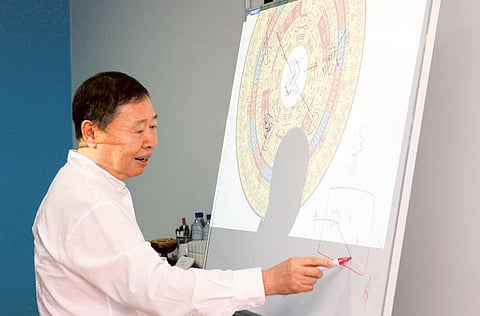Feng shui revisited with Grand Master Raymond Lo
Grand Master Raymond Lo claims to have all the answers

Feng shui is a bit like bottled water. Thirty years ago, had someone announced regular H2O would be sold to the masses for more than you pay for a decent lunch, anyone within earshot would have fallen to the ground in hysterics.
Although the Chinese have been practising the ancient art for more than 4,000 years, it’s hard to believe the hysteria the glorified, not to mention expensive, interior-design option could create.
Maybe it’s just the sceptic in me, but that’s the way I see it.
Ironically it was the same sceptic which made me the perfect candidate for a master class in feng shui. Fabulous.
“A sceptical mind is critical,” said Grand Master Raymond Lo, a feng shui expert with more than 40 years’ experience in the field. “You have to be able to question what true feng shui is and what isn’t.”
Conjuring images of dragons, super-powered auras and magic potions (after all, I’m sitting with a Grand Master which screams fantasy world) Raymond reminded me he was just a man from Hong Kong called Raymond.
“I’m not a superhero,” he laughed at my disappointment. “Feng shui is not intuition. It is logical and calculated; It is something learnt, not genetically acquired. I have met people before who claim they are good at advising on the subject because their great, great grandfather was a feng shui master. It doesn’t work like that. Anyone can learn the art starting from today. It is something practised, not passed down through generations by good genes.”
Grand Master is no title to be sniffed at. There are only five in the world, all granted the title by the International Feng Shui Association based in Singapore.
“The title of Master is given out of respect alone,” he said humbly. “It is something students say to someone respected in the field. But Grand Master is a step higher and is given by the official body.”
Having studied Economics and Business at university in Hong Kong, happy with his degree in his back pocket, Raymond started to explore his more curious side.
“I was always fascinated by mystery and astrology and horoscopes, and it was my simple curiosity which fuelled my desire for feng shui.”
Four teachers almost crushed his search, each given information which lacked common sense.
“The biggest misconception is that feng shui is a kind of magic. It’s not,” he said. “It’s a form of science which follows logical paths leading to common sense ideas and outcomes.”
In town to teach a master class in feng shui at Illuminations, a wellbeing centre at Jumeirah Lake Towers, Raymond is keen to pass on the knowledge he has gathered over the years.
Q. What is feng shui?
A. The literal meaning is wind (feng) and water (shui). It’s an ancient study and analysis of the interaction between people, buildings and their environment. The study reveals how to balance the energies of any given space to assure the health and good fortune of the people inhabiting it.
Q. Why are there so many contradictions in feng shui forms?
A. Hundreds of years ago feng shui was something only the kings were exposed to. They would release false information about it because they didn’t want to give people the power. Unfortunately, this meant that along with the genuine art, there were also unreliable teachings that were passed down.
Q. Can feng shui be taught from a book?
A. No, not in my opinion. It can arouse interest and quench curiosity, but if you want to learn how to practise it effectively, you must learn from a Master or a Grand Master.
Q. Is it more than just moving furniture around?
A. It’s much deeper than that. It’s scientific and uses a compass to determine direction and energy surges. Colour, shape and positioning of furniture can affect everything from sleep patterns to general comfort, which all in turn affect your success in life.
Sign up for the Daily Briefing
Get the latest news and updates straight to your inbox



